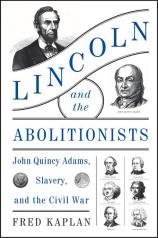Lincoln and the Abolitionists: John Quincy Adams, Slavery, and the Civil War
Review
Lincoln and the Abolitionists: John Quincy Adams, Slavery, and the Civil War
In a thoroughly researched examination, distinguished professor and author Fred Kaplan (JOHN QUINCY ADAMS: American Visionary, LINCOLN: The Biography of a Writer) presents a lesser-known side of the President who signed the Emancipation Proclamation, a side that may challenge his long-held place as a champion of the rights of African slaves. Focusing on a brief period, beginning in 1837, when the careers of John Quincy Adams and Abraham Lincoln overlapped, the author shows their differing reactions to events of that time of upheaval.
"Kaplan’s dense penetration into this subject allows us to consider the matter of slavery in detail, revealing how Americans, including our great leaders, viewed it when it was an established part of American life."
Contrasting Lincoln with Adams, Kaplan makes the case that Lincoln did in fact believe in the separation of races, stating in 1858 that “As God made us separate, we can leave one another alone and do one another much good thereby.” He was willing to use the issue of miscegenation as fodder for humor when running for the Senate, and made his conviction plain at that time that the white race was superior. Yet he recognized that slavery as an institution was immoral. Adams, by contrast, had long been a vociferous activist for abolition and, like his parents, refused to own slaves. Returning to Congress after leaving the presidency, he continually pushed for open dialogue and a hearing for the abolition movement among his fellow legislators. Such thorny questions as the Louisiana Purchase, which by implication allowed that the slavery practiced there was acceptable in the nation, would further separate the pro-slavery advocates from the small but growing number of abolitionists.
As President, Lincoln was reluctantly bound to deal with the complexities of the slavery question, which was a race issue as well as an economic one. If slaves were freed, how would their owners be compensated? Resettlement to Africa at first seemed the most rational solution, with Liberia touted as an earthly paradise for that purpose. But again, economics raised its head: Who would pay for the massive colonization initiative needed to make America, as many longed for, an all-white country? For President Lincoln, Kaplan states, the task was “to take white America down the road of what became total war and, eventually, total emancipation.” But the author also points out that, unlike Adams, a predecessor in that high office, Lincoln could never make the leap from private opposition to slavery on moral grounds, to public, active condemnation and work for change.
Kaplan’s dense penetration into this subject allows us to consider the matter of slavery in detail, revealing how Americans, including our great leaders, viewed it when it was an established part of American life. The importance of such consideration is evident as, even now, concerns about race and rights continue to bleed slowly from the unhealed wounds of the past.
Reviewed by Barbara Bamberger Scott on June 16, 2017
Lincoln and the Abolitionists: John Quincy Adams, Slavery, and the Civil War
- Publication Date: June 12, 2018
- Genres: History, Nonfiction
- Paperback: 416 pages
- Publisher: Harper Perennial
- ISBN-10: 0062440020
- ISBN-13: 9780062440020




